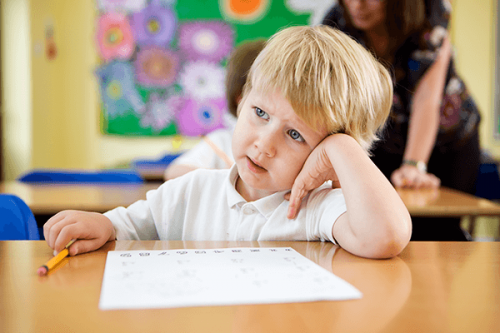My Child Gets Distracted at School: What Should I Do?

“My child gets distracted at school.” This exclamation is frequently repeated by many mothers and one of the most recurrent concerns related to school-age children.
Children’s lack of attention can alter their learning and academic performance.
There are many publications that try to approach this topic from different points of view.
We’ll provide an overview of the difference between a loss of attention and attention deficit disorder, as well as recommendations and exercises to perform at school and at home.
My child gets distracted at school: what should I do?
The difference between poor focus and attention deficit disorder
Before addressing this issue, it’s important to make a distinction between a child who loses focus in class due to external stimuli and those who actually suffer from a condition called attention deficit disorder, or ADD for short.
The first condition is more common than parents might think and never lingers for a long time. Generally, it’s temporary. If provided with the necessary stimuli, the children immediately recover their ability to concentrate.
The second group represents only 5% of the child population. Attention deficit disorder is a permanent disorder, and children belonging to this population need even more concentration exercises than the other group.

What can I do if my child gets distracted in class?
Recommendations and exercises to recover attention
As we explained in the previous section, concentration exercises are beneficial for children with a temporary loss of attention due to external stimuli, as well as for children struggling with ADD.
For both groups, it’s important to design strategies that are developed in the classroom and then reinforced at home.
Next, we’ll explain the actions that can be implemented in both areas:
Plan for school
It’s important that you talk with your child‘s teacher so that you can plan a strategy together for the distracted child. In this sense, the most common actions and current teaching strategies to get the child’s attention include:
- Seating the child in the first row in front of the teacher’s desk
- Keeping him away from the more talkative children, but also allowing him to maintain interactions with his classmates
- Constantly looking him in the eyes when speaking in order to make the child feel the need to be alert
- Asking him surprise questions frequently
However, this plan must not just take place at school. At home, certain actions must also be taken to reinforce the child’s ability to be attentive.
Generally, distraction by external stimuli is something temporary, and if the necessary stimuli are provided, children immediately recover their ability to concentrate.
Plan for home
There are multiple options to strengthen your child’s attention span at home. Let’s begin with the actions linked to studying and reviewing school activities.
How to do homework?
It is essential that a child with attention problems have his own study space where he can do school work.
He must have a desk or table of his own and an ergonomic chair. He should also have good lighting and shouldn’t have toys or distracting elements around.
Also, you must turn off the TV and keep his tablet or cell phone away while he does his homework.
Don’t stay with him and watch him while he studies. Instead, circulate in and out of his room.
This action is analogous to the teacher’s behavior in the classroom, and your child will feel your support as he carries out his tasks.
Also, tell him to start working on the most difficult task first. That way, he won’t get tired and feel frustrated or abandon his obligations.
Always congratulate him when he finishes his homework. Thus, he’ll feel encouraged to continue studying and performing his tasks. He’ll also feel proud of his effort.

Extracurricular activities
- Enroll your child in music lessons, such as the piano or violin. Motor activities stimulate patience and concentration.
- Have the child color mandalas, or take him to painting classes
- Give him a puzzle and help him put it together
- Play chess with your child
- Help him cut out figures. This action also stimulates his attention.
With these simple actions, your child’s attention will be greatly increased.
Remember that if you have questions or concerns about attention deficit disorder, you can talk with your pediatrician, a psychologist or a neurologist to rule out this pathology.
“My child gets distracted at school.” This exclamation is frequently repeated by many mothers and one of the most recurrent concerns related to school-age children.
Children’s lack of attention can alter their learning and academic performance.
There are many publications that try to approach this topic from different points of view.
We’ll provide an overview of the difference between a loss of attention and attention deficit disorder, as well as recommendations and exercises to perform at school and at home.
My child gets distracted at school: what should I do?
The difference between poor focus and attention deficit disorder
Before addressing this issue, it’s important to make a distinction between a child who loses focus in class due to external stimuli and those who actually suffer from a condition called attention deficit disorder, or ADD for short.
The first condition is more common than parents might think and never lingers for a long time. Generally, it’s temporary. If provided with the necessary stimuli, the children immediately recover their ability to concentrate.
The second group represents only 5% of the child population. Attention deficit disorder is a permanent disorder, and children belonging to this population need even more concentration exercises than the other group.

What can I do if my child gets distracted in class?
Recommendations and exercises to recover attention
As we explained in the previous section, concentration exercises are beneficial for children with a temporary loss of attention due to external stimuli, as well as for children struggling with ADD.
For both groups, it’s important to design strategies that are developed in the classroom and then reinforced at home.
Next, we’ll explain the actions that can be implemented in both areas:
Plan for school
It’s important that you talk with your child‘s teacher so that you can plan a strategy together for the distracted child. In this sense, the most common actions and current teaching strategies to get the child’s attention include:
- Seating the child in the first row in front of the teacher’s desk
- Keeping him away from the more talkative children, but also allowing him to maintain interactions with his classmates
- Constantly looking him in the eyes when speaking in order to make the child feel the need to be alert
- Asking him surprise questions frequently
However, this plan must not just take place at school. At home, certain actions must also be taken to reinforce the child’s ability to be attentive.
Generally, distraction by external stimuli is something temporary, and if the necessary stimuli are provided, children immediately recover their ability to concentrate.
Plan for home
There are multiple options to strengthen your child’s attention span at home. Let’s begin with the actions linked to studying and reviewing school activities.
How to do homework?
It is essential that a child with attention problems have his own study space where he can do school work.
He must have a desk or table of his own and an ergonomic chair. He should also have good lighting and shouldn’t have toys or distracting elements around.
Also, you must turn off the TV and keep his tablet or cell phone away while he does his homework.
Don’t stay with him and watch him while he studies. Instead, circulate in and out of his room.
This action is analogous to the teacher’s behavior in the classroom, and your child will feel your support as he carries out his tasks.
Also, tell him to start working on the most difficult task first. That way, he won’t get tired and feel frustrated or abandon his obligations.
Always congratulate him when he finishes his homework. Thus, he’ll feel encouraged to continue studying and performing his tasks. He’ll also feel proud of his effort.

Extracurricular activities
- Enroll your child in music lessons, such as the piano or violin. Motor activities stimulate patience and concentration.
- Have the child color mandalas, or take him to painting classes
- Give him a puzzle and help him put it together
- Play chess with your child
- Help him cut out figures. This action also stimulates his attention.
With these simple actions, your child’s attention will be greatly increased.
Remember that if you have questions or concerns about attention deficit disorder, you can talk with your pediatrician, a psychologist or a neurologist to rule out this pathology.
All cited sources were thoroughly reviewed by our team to ensure their quality, reliability, currency, and validity. The bibliography of this article was considered reliable and of academic or scientific accuracy.
- Andréu, M. M., de Larrinaga, A. Á. R., Pérez, J. A. M., Martínez, M. Á. M., Cuesta, F. J. P., Guerra, A. J. A., … & Esteban, B. B. (2016). Sueño saludable: evidencias y guías de actuación. Documento oficial de la Sociedad Española de Sueño. Rev Neurol, 63(Supl 2), S1-S27. https://ses.org.es/wp-content/uploads/2016/12/rev-neurologia2016.pdf
- Gavidia Márquez, G. G. (2018). La Miopía y su incidencia en el bajo rendimiento académico en los estudiantes de primero a tercer curso En La Unidad Educativa Caracol, Babahoyo-Los Ríos, Primer Semestre 2018 (Bachelor’s thesis, BABAHOYO, UTB 2018). http://dspace.utb.edu.ec/bitstream/handle/49000/4863/P-UTB-FCS-OPT-000010.pdf?sequence=1&isAllowed=y
- Korzeniowsk, C., & Ison, M. S. (2008). Estrategias psicoeducativas para padres y docentes de niños con TDAH. Revista Argentina de Clínica Psicológica, 17(1), 65-71. https://www.redalyc.org/pdf/2819/281921796006.pdf
- Jaramillo González, J. R. (2013). Hipoacusia leve y su influencia en el aprendizaje de un niño escolarizado (6-9 años) (Doctoral dissertation, Universidad de Guayaquil. Facultad de Ciencias Médicas. Carrera de Tecnología Médica). http://repositorio.ug.edu.ec/bitstream/redug/36703/1/CD%20011-%20JARAMILLO%20GONZALEZ%20JEFFERSON%20RUBEN.pdf
- Madrona, P. G., Jordán, O. R. C., & Barreto, I. G. (2008). Habilidades motrices en la infancia y su desarrollo desde una educación física animada. Revista iberoamericana de educación, 47(1), 71-96. https://rieoei.org/historico/documentos/rie47a04.pdf
- Nieves-Fiel, M. I. (2015). Tratamiento cognitivo-conductual de un niño con TDAH no especificado. Revista de psicología clínica con niños y adolescentes, 2(2), 163-168. https://www.redalyc.org/pdf/4771/477147186011.pdf
- Quintero, J., & Castaño de la Mota, C. (2014). Introducción y etiopatogenia del trastorno por déficit de atención e hiperactividad (TDAH). Pediatría integral, 9, 600-608. https://www.pediatriaintegral.es/wp-content/uploads/2015/01/Pediatr%C3%ADa-Integral-XVIII-9.pdf#page=12
This text is provided for informational purposes only and does not replace consultation with a professional. If in doubt, consult your specialist.








